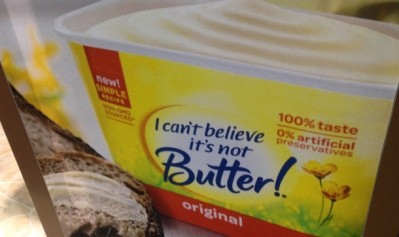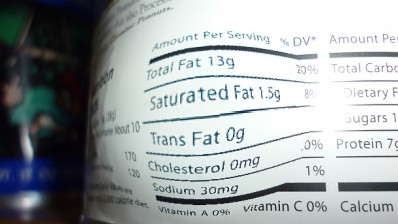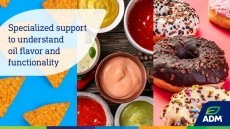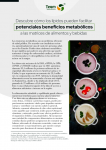Butter consumption is at a 40-year high, but margarine is the healthier option, says NAMM

Speaking to FoodNavigator-USA after submitting comments to the FDA about its proposal to revoke the GRAS status of partially hydrogenated oils (PHOs), NAMM president Richard Cristol said a typical serving of soft spread margarine has two thirds less saturated fat than butter, 25% fewer calories, no cholesterol and no trans-fat.
Margarine has been stigmatized for too long
Yet margarine has developed an image problem for being too processed or less ‘natural’ than butter, and a leading source of trans fats - when in fact partially hydrogenated oils (the key source of artificial trans fats) have been removed from all the leading brands and margarine has not been a significant contributor of trans fats to the American diet for years, said Cristol.

The American Butter Institute has just released data showing that Americans increased their butter intake by 25% since 2002, with per capita consumption at a 40-year high of 5.6 lbs/year in 2012 compared with 4.1 lbs/year in in 1997, he said, which equated to a big increase in saturated fat.
“This increase has occurred because margarine has been characterized as less healthy than butter, when the opposite is true. Margarine has been stigmatized for too long."
Margarine manufacturers have led the food industry in reducing and eliminating trans fats,
The FDA, meanwhile, has not helped matters by overstating the contribution that margarine makes to trans fat intakes by coding all margarines making ‘0g trans fat’ claims as containing 0.4g of trans fat in a 2012 analysis, when in fact they typically contained “at most half that amount”, he said.
“The FDA should stop inaccurately classifying margarine products as a category high in trans fat. Margarine manufacturers have led the food industry in reducing and eliminating trans fats, and today, all branded soft spread margarines contain no partially hydrogenated oil, while there are major brands of stick margarine that contain no partially hydrogenated oil. There are also private label soft spreads available without PHO.”
FDA has not proved that very low levels of artificial trans fats areunsafe

Cristol also argues, more controversially, that the FDA has “failed to meet its burden of proof for its tentative determination, scientifically as well as legally, that partially hydrogenated oil is unsafe”.
While the FDA says there is no safe level of trans-fat, there is not any compelling evidence linking very low levels of trans-fat to raised LDL (‘bad’) cholesterol, claimed Cristol. “The FDA proposal is based on the findings of bodies such as the Institute of Medicine (IOM) and the Centers for Disease Control (CDC), but they are all basing their data on a study by Ascherio et al*.
“But the data points under 3% of energy (6.5g trans fat) in that study do not conclusively show a true linear cause and effect relationship especially at levels of 1% and below.”
According to a recent evaluation of the evidence by scientific consulting firm Biofortis, there is a threshold under which trans fat has “little if any effect on LDL-cholesterol”, claimed Cristol.
“At the very least, Biofortis’ findings suggest that further research is necessary to determine if further reductions of ‘industrial’ trans fat below the FDA’s current consumption level of 1g will make a material difference in the risk of coronary heart disease.”
What is the legal status of partially hydrogenated vegetable oil?
Finally, he said, NAMM says there is some evidence that partially hydrogenated vegetable oil may, in fact, be a ‘prior-sanctioned substance’ that was permitted in foods - and contained in the margarine standard of identity - well before the GRAS list was published in 1958, in which case the FDA would need to go through a different process in order to ban it.
Smaller firms and foodservice players need more time to phase out PHOs

But if the FDA does proceed with its plan to phase out PHOs, it should do so gradually, he said.
“It has taken some manufacturers more than a decade to resolve processing challenges in order to eliminate PHO, so more time is needed, largely for sticks and foodservice margarine that continue to use nominal amounts of PHO.”
To eliminate partially hydrogenated oils, margarine manufacturers typically use a blend of palm oil and palm kernel oil (which are solid at room temperature), plus liquid oils such as soy and canola; while some also use interesterified oils, where the structure of oils is chemically or enzymatically re-arranged to make them more solid or stable, he said.
Meanwhile, new high oleic oils are coming onto the market offering exceptional functionality with no trans fats, but also less saturated fat, he said.
* Ascherio, A. et. al. (1999) ‘Trans Fatty Acids and Coronary Heart Disease,’ N. England J. Med; 340: 1994-1998.






















